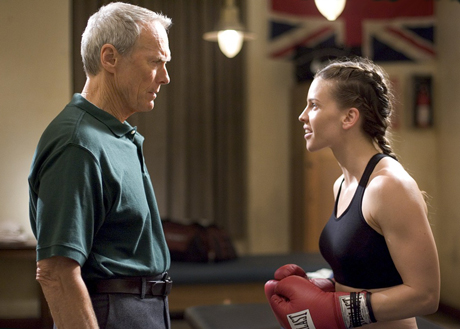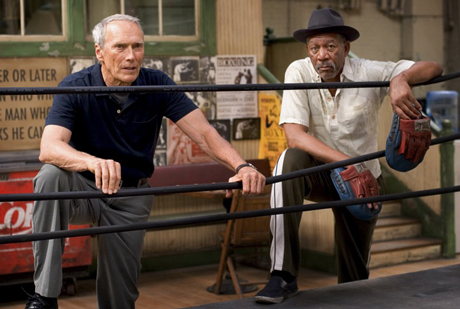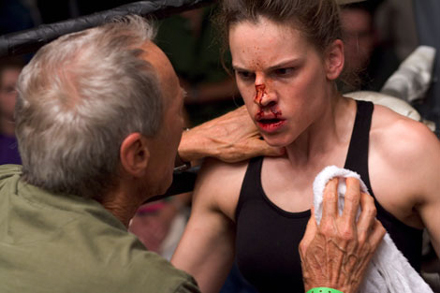|
|
Reviewed by Glenn Erickson
Happily moving between personally chosen projects, Clint Eastwood has managed an impressive career in an industry that now only allows a rarified few directors to amass a respectable list of credits. No director in Hollywood is more practical or less fussy. Eastwood will follow a dog like Changeling with a genuine gem like Gran Torino. His pictures always do better when he stars, even if he miscasts himself. When he's good, Eastwood shapes up as our last link to a time when terrific talents were making high-class genre fare: Don Siegel, Joseph Sargent, William Friedkin. 2004's Million Dollar Baby is one of his big winners, a solid box office hit that snagged Eastwood Oscars both for directing and for best picture.
Of all the Hollywood features to wring a story out of the boxing game, Million Dollar Baby may be the most likeable. The genre has been used for social comment, high tragedy and stellar self-aggrandizement, and sagas about worn out palookas have proven a far too tempting sponge for weepy sentimentality. Writer Paul Haggis touches most of these bases while 'keeping things real' at all times. When the movie does become sentimental, every old-fashioned heart tug is well earned.

Gym owner Frankie Dunn (Clint Eastwood) manages boxers on the side, but his cautious decisions have caused more than one talented hopeful to bolt, complaining that Frankie is holding them back. Old pal Eddie "Scrap Iron" Dupris (Morgan Freeman) helps run the gym and counsels Frankie on his managing choices, mostly without effect. Eddie allows the mentally handicapped Danger (Jay Baruchel) to practice in the gym for free, but cannot keep the aggressive trainee fighters from using the kid as a punching bag. Into this scene comes Maggie Fitzgerald (HIlary Swank), a highly motivated woman determined to get Frankie to manage her. Frankie greets her forthright entreaties with snubs and insults, but finally takes her on when Eddie convinces him that it's the right thing to do. He keeps trying to get Maggie to move on to another manager, and she resists. The friends are impressed when Maggie shows that she has what it takes to persist after a bad beating or two. She soon proves to be a natural slugger. Maggie's motivation is also strong -- she comes from a family of layabouts and freeloaders, and fights in the hope that success will turn all of their lives around. Accused of once again holding back a worthy hopeful, Frankie gives in again and secures big fights for his girl -- which means putting her up against dirty fighters like the present champion, Billie "The Blue Bear" (Lucia Jijker).
Million Dollar Baby was nominated for Best Screenplay but didn't win, which is a real crime. Paul Haggis' script recalls the work of the great screenwriters of the last century, only liberated from Production Code edicts. It's hard to believe that this talent also wrote the gloppy Crash, the Millennial decade's weakest Oscar winner. The roles seem tailor-made for the three lead stars, who form a sort of substitute family. Frankie Dunn brings out the best in Eastwood's acting range. Dunn may be too soft for the tough boxing business. He holds his fighters back from risk, and always has doubts about his own judgment. Later on it becomes arguable that Dunn swings the other way, and isn't careful enough. A key scene occurs when Frankie backs down from a confrontation with Maggie's worthless, greedy brother. We aren't used to seeing Dirty Harry do that, even in his late '70s. The gamble that is pro boxing suddenly deals Maggie a terrible hand, and Frankie can't help but feeling wholly responsible for her. She's the daughter to replace the one he's lost, just as Frankie and Eddie are the decent family Maggie deserves but was denied.

Thanks to a masterful merge of written character and acting talent, Morgan Freeman's Eddie transcends the category of 'Eastwood sidekick' that was one of few weaknesses in their previous winner Unforgiven. Eddie's gym rat is an amiable gambling addict; he serves as Frankie's conscience and second-guesser without the expected Sancho Panza worship elements. What's more, Freeman remarkable voice allows writer Haggis to bring back a lost art of Hollywood movies, narration voice-overs. The passages here add to the atmosphere rather than stitch up continuity holes, or redundantly tell the story out loud. I'm guessing that the half-poetic flavor of Eddie's observations is derived from the original F.X. Toole stories. We immediately feel as if we're hearing the voice of an intimate insider to the boxing game. It's another reason why Million Dollar Baby is a pleasure to watch.
Hilary Swank is so remarkable as the determined would-be boxer that we wonder if Eastwood keyed his performance to her intensity and enthusiasm. Maggie Fitzgerald is a woman from an entirely new mold, in Hollywood terms -- she takes brutal beatings as well as would any man. I would imagine she's the image of the new breed of woman eager to take up the new right to enter what previously were male professions. Did women enlist in the Army from Swank's inspiration, looking for an environment to pursue what were once traditionally non-feminine pursuits?
Maggie actively seeks the ideal father figure in a trainer, as if she's looking to secure at least one trusting, open relationship in her life. Our heart breaks as we see her run up against the wall of ignorance and venality represented by her family. We also become concerned when both Frankie and Eddie fail to take into account Maggie's relative inexperience. It's possible that their love blinds them to her too-trusting attitude. The finished film brings out subtleties like this, making the show's big fights as nerve-wracking as if it were our daughter or sister stepping into the ring.

Million Dollar Baby has perhaps the most tragic conclusion of any boxing movie, but one handled with a loving pragmatism that surely offended viewers. Yet the movie had such charisma, and Eastwood is such an icon to conservatives that a few media voices condemning the morality of Maggie and Frankie's final choice were largely ignored. It's like the failed attempt by ideologues to slam Avatar as tree-hugger propaganda. When an overwhelming percentage of the movie-going public loves a picture, touchy controversies tend to evaporate. The show is simply a solid winner -- Clint Eastwood must have seen its quality from the beginning.
Warner Home Video's Blu-ray of Million Dollar Baby is the expected handsome, flawless digital transfer that replicates the theatrical experience in all details. All of Eastwood's company of associates and collaborators do fine work, especially cameraman Tom Stern and the veteran production designer Henry Bumstead.
The disc is a 10th Anniversary edition, with new extra content. Eastwood, Freeman and Swank appear in On the Ropes, a featurette focusing on the difficulty of filming Million Dollar Baby without compromising its darker aspects. And producer Albert Ruddy weighs in with a full-length feature commentary. Held over from earlier editions are several other featurettes, including one with James Lipton (that I'll admit I avoided).
Hate boxing movies? Give Million Dollar Baby a try ... I should have seen it years ago.
On a scale of Excellent, Good, Fair, and Poor,
Million Dollar Baby Blu-ray rates:
Movie: Excellent
Video: Excellent
Sound: Excellent
Supplements: commentary, interviews, featurettes (see above)
Deaf and Hearing-impaired Friendly?
YES; Subtitles: English, French, Spanish
Packaging: Keep case
Reviewed: February 3, 2014

Text © Copyright 2014 Glenn Erickson
See more exclusive reviews on the Savant Main Page.
The version of this review on the Savant main site has additional images, footnotes and credits information, and may be updated and annotated with reader input and graphics.
Return to Top of Page
|

